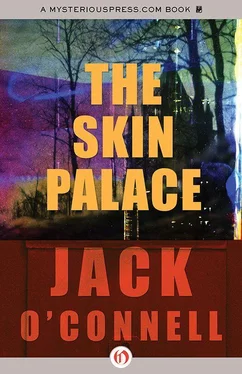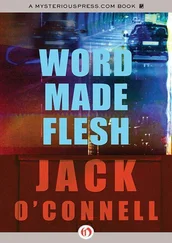The Kierling was on Havetta Boulevard in Old Loew Square, just three blocks away from Papa’s haberdashery. It was an old building, originally used for live performances, particularly those of the touring Yiddish troupes that passed through Maisel seasonally. It was purchased the year before Jakob’s birth by an insomnia-plagued Zionist named Yitzhak Levi-Zangwill who converted it to the city’s first all-night cinema. And though the Kierling was forever in a state of evolving disrepair, its original, homey beauty managed to shine through its ramshackle facade. It could only seat a little over two hundred people and its offerings usually consisted of scratchy prints of decades-old, B-budget, American crime dramas. But there were always homemade dumplings and cinnamon kava for sale in the lobby and if a splice broke before the movie ended, Yitzhak gave a full refund and a promise of a double feature the next week. This invoked a loyal camaraderie among the regulars, among whom no one was a more faithful visitor to the Kierling than Felice Fabri.
Felice began taking Jakob to the movies when he turned six. She’d rush through the cleaning and the laundry, then run the length of Jesenska Way with the boy in tow, just in time for the afternoon matinee. Cousin Felix balked at the Kierling from the start and Felice began to leave him with the neighborhood women so that she and Jajob didn’t miss a screening of The Reckless Moment or A Double Life. Then after the show, as the credits rolled, she’d reverse her sprint, falling into the kitchen in time to make supper for Hermann. At the evening meal she’d always cringe with the fear that Papa Kinsky had discovered how she and the boy were spending their days. But the patriarch simply grunted for more boiled ham and stewed fruit, his mind a thousand miles away from the comings and goings of the servant girl.
Years passed in this manner and the Kierling Theatre became Jakob’s sole reference point, his school and his playground. And something more. As Felice often whispered to him during the coming attractions, Remember, little Jako, this is our church.
If the Kierling was a holy building, Jakob wondered if this meant the people he watched on the screen — bodies blown up beyond life-size, faces spread out as big as the houses on Diamant Road — were prophets. Or maybe angels. Non-human beings full of arcane wisdom whose job was to lead him toward salvation. Their strange names seemed like something out of a foreign and sacred book— Alan Ladd, Gloria Grahame, Dan Duryea, Coleen Gray, Neville Brand, Audrey Totter, Farley Granger, Valentina Cortesa, Ray Teal. His young brain tried to memorize the lessons of their black-and-white movements, draw conclusions from the turmoil of their tormented, shadowy lives. In the end, all his trips to the Kierling became stations in one long pilgrimage. And if a decade of chewing prune jelly drops for lunch didn’t help his general health and constitution, by the time he entered adolescence, Jakob Kinsky had an aesthetic sense that went beyond convictions about art and beauty. He had an elaborate cosmology regarding how the universe is put together. And how it comes apart.
Which was shaken to the point of rupture during one cold autumn weekend. Jakob had just turned fifteen years old. And while cousin Felix was already starting to extort from his first merchants and assemble a loose gang of boythieves to do his bidding, Jakob was still worshipping at the patched white altar of the Kierling, taking his first steps into the priesthood of the film-religion by buying a small notebook that he could hide under his mattress and fill with his virginal attempts at a screenplay.
Felice at this time was more edgy and distracted than ever. Jakob couldn’t understand her skittishness. It couldn’t be the increase in the street beatings, as those were directed mainly at the Hasidim. And they’d stopped worrying about Papa’s wrath years ago when they both came to realize that nothing happened in Old Loew Square without Hermann Kinsky’s knowledge and consent and as long as supper was ready when he came through the door each night, they could spend their days in Moravia for all he cared.
Then came the moment that Jakob now thinks of as the fall from grace. He had stayed up late into the night, scribbling in his notebook, writing down dreamlike images of a doomed man in a crumbling city. He fell into nightmare still gripping his pencil and woke in the morning to find the apartment empty, Papa and Felix already out on the prowl for fresh veins of blood and money. When he failed to smell coffee or the harsh smoke of her cigarettes, Jakob knew Felice had not arrived. He found a note slipped under the door—
Kiss Me Deadly
this afternoon at the Kierling.
Meet me in Dvetsil Park.
Felice was waiting for him on one of the benches by the Pietà where the university students came to neck. She’d already purchased their two tickets. As they made their way to their favorite seats in the rear of the Kierling, Jakob saw Yitzhak Levi-Zangwill wink at the governess in a manner that brought on chills.
An hour into the film, as Jakob stared up, fascinated by the strangeness of this story, as he tried to pull apart how the look of the picture was achieved, he heard Felice shift in her seat. A moment later, he felt her hand in his lap. Confused, he offered her his popcorn. She took the box of buttered kernels and put it on the floor, then slid her arm around his shoulder, pulled his body toward her and began to kiss and suck at his neck.
Jakob’s first instinct was to flee the Kierling, but he stopped himself and as a warmth spread through his legs and stomach, he gave in to a flood of jumbled but intense sensation, pulses shooting through his system that lacked any precedent. Without being fully aware of his actions, he pulled Felice Fabri — his lifelong nanny, a woman twice his age, his mentor, his counselor, his only benign, working definition of human into his lap and he began to kiss and fondle and grope her with no regard to the pockets of watchers lodged just a few rows away.
It was the first time in a decade he missed the end of a Kierling feature.
“We’re almost there,” Hermann Kinsky interrupts. “Jump ahead to new business, Gustav.”
Gustav Weltsch hates altering the orderly flow of his thoughts. He finds it a waste. Hermann lets the numbers and projections bounce off him. Kinsky decides on a new venture based entirely on the sensation in his stomach. And it makes Gustav feel as if he’s present at these summits merely as decoration, an icon, the brainy, bean-counting analyst that a man of Hermann Kinsky’s growing reputation should have at his side. If only Hermann would listen once in a while. They could have goosed their gross take twenty percent over the past eighteen months. Gustav has tried to tell the man that the future lies in soybean-based fast foods and genetic manipulation. Weltsch has the statistical models and theorems to back it up. It’s plain as day. But Kinsky is lodged in dying notions of real estate and banking and the vice markets. The world is ready to leave Hermann behind. He bases his moves on superstition, revenge, and instinct. And the fact is that Hermann’s intuition fails him on occasion. Those film booths he picked up from Yunfat are bleeding him day and night. They don’t even generate enough dollar volume to serve as minor laundries for semi-sour cash. You can’t even dismiss them as trophy boutiques, like the nightclub or the gambling lodge or Der Geheime Garten. There’s no sex or flash to these Snapshot Shacks. It’s like owning a garbage dump. Vulgar. Common. Better to drop the match tonight than waste another month on these embarrassments.
Gustav knows, though his boss will never admit it, that Kinsky held onto the Shacks for Jakob, thinking something vague like: They’re shaped like cameras, the boy likes the cameras, the boy will like this business. No spreadsheet in the world can argue with motivations like that. It’s the apples and the oranges. So, once again, Gustav nods and moves on to hew business.”
Читать дальше











